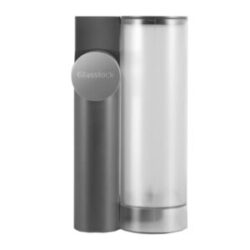16.3 定语从句
定语从句是形容词性从句, 用来修饰主句中的名词或代词。其作用相当于定语,故称定语从句。 被定语从句所修饰的对象称为先行词。 定语从句一般紧随它所修饰的先行词之后, 并由关系代词或关系副词引导。
16.3.1 限制性定语从句?
 亚马逊导购
亚马逊导购  卑诗省当天新盘
卑诗省当天新盘  读新闻学外语
读新闻学外语
限制性定语从句用于限定或说明其所修饰的词的范围或性质等。从句与先行词关系密切,如果省略的话则会造成主句意义不完整。先行词在定语从句中充当某个语法成份(如充当主语、宾语,定语或状语等)。
1)关系代词引导的定语从句
(1) 由 that 引导的定语从句
that 可以指人或物。 在定语从句中作主语、宾语或表语, 作宾语或表语时可以省略。
The man that visited our school is from Australia.到访我们学校的那个人来自澳大利亚。
Is oxygen the only gas that helps fire burn? 氧气是唯一的助燃气体吗?
The girl (that) I saw is called Mary. 我见到的那个女孩名叫玛丽。
Is there anything else (that) you require? 你还需要别的东西吗?
My hometown is no longer the place (that) it used to be. 我的家乡再也不是以前那个样子了。
(2)由 which 引导的定语从句
which 指物, 在定语从句中作主语或宾语。
I do not like stories which have unhappy endings.我不喜欢有不幸结局的小说。
That was a fault which could not be forgiven. 那是不能饶恕的错误。
Have you seen the watch (which) I left here just now? 你看到我刚才放在这里的手表了吗?
These are the wires with which different machines are connected. 这些是连接不同机器的电线。
The reason for which he refused to go to the party was that they had not invited him to.
他拒绝去赴宴的原因是他没受到他们的邀请。
(3)由 who 引导的定语从句
who 指人,在定语从句中作主语。
Anybody who breaks the laws will be punished. 任何违反法律的人都将受到惩罚。
Do you know the boys who are standing over there? 你认识站在那边的那些男孩吗?
[注] 在口语中,可以用who代替whom, 在定语从句中作宾语。
The man who I saw told me to wait. 我见到的那个人叫我等。
I know the man who you were speaking to just now. 我认识你刚刚和他讲话的那个人。
(4)由 whom引导的定语从句
whom 指人,在定语从句中作宾语或表语。
The doctor whom you are waiting for has left. 你一直在等的那位医生已经离开了。
Is she the very person whom we must take good care of? 她就是那个我们必须好好照顾的人吗?
They are looking for the patient on whom doctors just performed an operation.
他们正在寻找那位医生刚刚给他做过手术的病人。
(5)由 whose引导的定语从句
whose 通常指人,也可指物,在定语从句中作定语。
There are some students whose questions I can’t answer. 有些学生的问题我回答不了。
They lived in a room whose window opened to the south. 他们住在一间窗户朝南开的房间里。
Once there was a wise king whose name was Alfred.
从前有一个明智的叫阿尔弗雷德的英国国王。
Can you see the mountain whose top is covered with snow?
你看得见山顶上覆盖着雪的那座山吗?
2)关系副词引导的定语从句
(1) 由when 引导的定语从句
I’ll never forget the days when I worked with you. 我永远不会忘记我与你共事的日子。
Can you still remember that evening when we met for the first time?
你还记得我们第一次见面的那个晚上吗?
(2) 由 where 引导的定语从句
This is the town where I was born. 这是我出生的城市。
She would like to live in a country where it never snows. 她喜欢住在不下雪的国家。
Who can think of a situation where this phrase can be used? 谁能想出用这个短语的情况?
Her career has reached the stage where she must decide what to do next.
她的事业已经到了必须决定下一步该怎么办的阶段。
I’ve come to the point where I can’t stand him. 我已经到了无法忍受他的地步。
(3) 由 why 引导的定语从句
I don’t know the reason why he didn’t tell it to his father.
我不明白为什么他没有把这件事告诉他父亲。
That’s the reason why she left home. 那就是她离家出走的原因。
Is this the reason why he refused our offer? 这就是他拒绝我们帮助他的理由吗?
We can’t accept the excuse why you were absent. 我们无法接受你缺席的借口。
This is the explanation why they put off the meeting. 这是他们为何推迟会议的解释。
3)有一些定语从句常可省列引导词
(1) 一些表示时间的定语从句可以省列when
You may go there any time you like. 你随便什么时候都可以去那儿。
By the time you arrive in London, we will have stayed there for two weeks.
等你到达伦敦的时候我们已经在那里呆了两周了。
I still remember the first time I met her. 我仍然记得我第一次见他的时候。
Each time he goes to business trip, he brings a lot of living necessities.
每次出差的时候他都要带很多日常用品。
Do you know the year the book was published? 你知道那本书出版的年份吗?
(2) where 有时也可以省列
This is the place they met yesterday. 这就是他们昨天碰头的地方。
That is the place I was born. 这是我出生的地方。
(3) 先行词为way 时,定语从句的引导词也可以省列。
I don’t like the way he laughed at me. 我不喜欢他用那种方式来嘲笑我。
Do it the way I showed you. 按我教你的那样做。
Stop kicking my dog, or I will treat you the way you treat it!
别再踢我的狗了,不然我会用你对待它的方式修理你!
4)宜用that 而不宜用which引导定语从句的情况
(1) 当先行词是anything, everything, nothing, something, few, all, none, little, some 等不定代词时。
Finally, the thief handed everything that he had stolen to the police.
最后,那个贼把他偷的所有东西都交给你警察。
This is all that I want to say at the meeting. 这就是我在会上要说的。
I have nothing that is worth reading. 我没有什么值得一读的东西。
Is there anything that I can do for you? 有什么我可以帮你的吗?
Every car that has a high price is worth what it costs. 每辆高价的车都有它的价值。
(2) 当先行词被序数词修饰的时候。
You are the first person that I want to ask for. 你是我要见的第一个人。
This is the second book that I have ever written. 这是我写的第二本书。
(3)当先行词被形容词最高级修饰时。
This is the most beautiful city that I’ve ever seen. 这是我见过的最漂亮的城市。
The dinner was the most expensive meal (that) we had ever had. 那是我们吃过的最贵的晚餐。
(4)当先行词被the very, the only, the same, the last 修饰时。
This is the only painting in this style that we have. 这种风格的画我们仅有一幅。
This is the very pen that I am looking for. 这正是我找的钢笔。
You are the last person that I want to see. 你是我最不想见到的人。
This is the same pen that I lost last week.这就是我上周丢失的那支钢笔。
(5) 当先行词前面有who, which 等疑问代词时。
Who that you have ever seen can beat him in chess? 你曾见过谁能在棋艺上打败他?
Which is the book that you bought yesterday? 那本是你昨天买的书?
(6)当先行词既有人,又有动物或者物体时。
He talked happily of the writer and his books that interested him.
他兴高采烈地谈起让他感兴趣的作家以及作家的书。
The professor and his achievement that I heard about are admired by them .
我听说的那位教授和他的成就得到他们的赞美。
16.3.2 非限制性定语从句
非限制性定语从句与先行词的关系松散,只起补充说明的作用。 去除非限制性定语从句对主句的意义影响不大。非限制性定语从句由逗号隔开,在翻译成中文时,常可译成一个并列句。引导非限制性定语从句的关系代词有 which, who, whom, whose, as; 关系副词有 when 和 where。 非限制性定语从句不能由关系代词that引导。
1) 由which 引导的非限制性定语从句
Her house, which was built a hundred years ago, stood still in the earthquake.
那座房子在地震中依然耸立,它是一百多年前建造的。
This novel, which I have read three times, is very touching. 这本小说很动人,我已经读了三遍。
Recently I bought an ancient Chinese vase, the price of which was very reasonable.
我最近买了一个中国古代的花瓶,价格很合理。
注: which 有时不代表一个名词, 而是代表前面整个句子或句子的一部分。
The sun heats the earth, which makes it possible for plants to grow.
太阳给予大地热能,这样植物才有可能生长。
He didn’t pass the exam,which disappointed me. 他没通过这次考试,令我很失望
2) 由 who 引导的非限制性定语从句
Charlie Chaplin, who died in 1977, is considered one of the greatest and funniest actors in the history of the cinema.
查理卓别林,卒于1977年,他被认为是电影史上最伟大最搞笑的演员之一。
Charles Smith, who was my former teacher, retired last year.
查理•史密斯去年退休了,他曾经是我的老师。
3) 由 whom 引导的非限制性定语从句
He was eager to go to the hospital to see his stepmother, whom he loved and respected as his own mother.
他急于想去医院看望他的继母,他把他的继母当作亲生母亲一样热爱和尊敬。
Her sons, both of whom work abroad, rang her up this morning.
她的两个儿子今天早上打电话给她,他们都在国外工作。
The eighty-nine passengers all escaped without serious injury,four of whom were Americans.
89名乘客全部脱险而没受重伤,其中有4个是美国人。
4) 由 whose 引导的非限制性定语从句
Look at the building, whose roof is white. 看那栋楼,楼顶的颜色是白的。
5) 由 when引导的非限制性定语从句
He will put off the picnic until May 1st, when he will be free.
他将把郊游推迟到5月1号,那时他将有空。
At the time when I saw him, he was well. 我见到他那时,他身体还不错。
6) 由 where引导的非限制性定语从句
They went to London,where they lived for six months.
他们去了伦敦,在那儿呆了六个月的时间。
Some pre-school children go to a day care center, where they learn simple games and songs.
有些学龄前儿童被送到日托中心,在那他们可以学到简单的游戏和歌曲。
They stood on the top of the building, from where they could see the whole city.
他们站在楼顶上,从那儿能看到整个城市。
16.3.3 较少见的定语从句
以下几类定语从句比较少用。
1)由 whereby, wherein, whereupon 引导的定语从句
They have set a plan, whereby you can spread your costs.
他们定出了一个方案,照此你可以分期付款。
He gazed once more around the room, wherein was assembled his entire family.
他再环视了一遍这个房间,这里曾住了他们全部家人。
I told her that she looked fat, whereupon she threw the saucepan at me and burst into tears.
我跟她说她看来很胖,为此她把平底锅砸向我,突然哭起来。
2)as 和such 相互搭配引导的定语从句。
He’s not such a fool as he looks. 他没有他看起来那么傻。
I never heard such stories as he tells.我从未听过他讲的这类故事。










